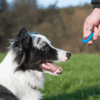How to Treat Dog UTI at Home
If you have a dog, you probably know how much they love to play, run, and explore. But sometimes, their adventurous spirit can get them into trouble, especially when it comes to their urinary health. Urinary tract infections (UTIs) are one of the most common health problems that affect dogs, and they can cause a lot of discomfort and pain for your furry friend. In this article, we will tell you everything you need to know about dog UTI, including what causes it, what are the symptoms, how to treat it at home, and how to prevent it from happening again.
What is Dog UTI and What Causes It?
A urinary tract infection (UTI) is a bacterial infection that affects the urinary system of dogs. The urinary system consists of the kidneys, ureters, bladder, and urethra, and it is responsible for filtering and eliminating waste and toxins from the body. When bacteria enter the urinary tract, they can multiply and cause inflammation, irritation, and infection.
There are many factors that can increase the risk of UTIs in dogs, such as:
Gender: Female dogs are more prone to UTIs than male dogs, because they have a shorter and wider urethra, which makes it easier for bacteria to enter and reach the bladder.
Age: Older dogs are more likely to develop UTIs than younger dogs, because they have weaker immune systems and lower urine concentration, which makes it harder to flush out the bacteria.
Health conditions: Dogs with diabetes, kidney disease, bladder stones, prostate problems, or other health issues that affect the urinary system are more susceptible to UTIs, because they have impaired urine flow and increased urine retention, which create a favorable environment for bacterial growth.
Hygiene: Dogs that have poor hygiene, such as dirty or matted fur around the genital area, or dogs that are exposed to contaminated water or soil, are more at risk of UTIs, because they can introduce bacteria into the urinary tract.
Diet: Dogs that eat low-quality or unbalanced food, or dogs that consume too much salt, sugar, or artificial ingredients, are more prone to UTIs, because they can alter the pH level and acidity of the urine, and cause inflammation and irritation in the urinary tract.
What are the Symptoms of Dog UTI?
If your dog has a UTI, you may notice some of the following signs and symptoms:
Frequent urination: Your dog may urinate more often than usual, or in small amounts, or in inappropriate places, such as inside the house or on the furniture.
Blood in the urine: Your dog may have blood or blood clots in the urine, which can make it look red, pink, or brown.
Pain or difficulty urinating: Your dog may show signs of pain or discomfort when urinating, such as whimpering, crying, licking, or straining. Your dog may also have difficulty starting or stopping the urine stream, or may dribble urine after urinating.
Foul-smelling urine: Your dog may have urine that smells bad, sour, or fishy, which indicates a bacterial infection.
Behavioral changes: Your dog may become more lethargic, depressed, or irritable, or may lose appetite or interest in activities. Your dog may also show signs of fever, such as shivering, panting, or warm ears or nose.
If you notice any of these symptoms in your dog, you should take them to the vet as soon as possible, because UTIs can lead to serious complications, such as kidney damage, bladder rupture, or sepsis, if left untreated.
How to Treat Dog UTI at Home?
If your dog has a mild or uncomplicated UTI, you may be able to treat it at home with some natural remedies, but you should always consult your vet before trying any home treatment, and follow their instructions carefully. Some of the home remedies that can help treat dog UTI at home are:
Cranberry juice or supplements: Cranberries are rich in antioxidants and proanthocyanidins, which are compounds that can prevent bacteria from sticking to the walls of the urinary tract and bladder. They can also help reduce inflammation and acidity in the urine, and boost the immune system. You can give your dog cranberry juice or supplements as directed by your vet, but make sure they are unsweetened and natural, and not mixed with other fruits or sugars. You can also add some water to the juice to dilute it and make it easier for your dog to drink.
Apple cider vinegar: Apple cider vinegar is another natural remedy that can help balance the pH level of the urine and prevent bacterial growth. It can also help flush out the toxins and impurities from the urinary tract, and improve the overall health of your dog. You can add a teaspoon of apple cider vinegar to your dog’s water bowl or mix it with their food once a day, but do not give apple cider vinegar to dogs with kidney problems or acid reflux, as it can worsen their condition.
Water: Water is essential for flushing out the bacteria and toxins from the urinary tract, and keeping your dog hydrated and healthy. You should make sure your dog has access to fresh and clean water at all times, and encourage them to drink more by adding some chicken broth or ice cubes to their water bowl. You can also moisten their dry food with water or broth to increase their water intake, and avoid giving them caffeinated or alcoholic beverages, as they can dehydrate and irritate the urinary tract.
Herbs: Some herbs can have antibacterial, anti-inflammatory, and diuretic properties that can help treat dog UTI at home. Some of the herbs that can help your dog are uva ursi, marshmallow root, parsley, dandelion, and nettle. You can make a herbal tea by steeping these herbs in hot water and letting it cool down, then giving it to your dog as directed by your vet. You can also buy herbal supplements or tinctures that are specially formulated for dogs, and follow the dosage and instructions on the label.
These are some of the home remedies that can help treat dog UTI at home, but they are not enough to cure the infection completely. You should also take your dog to the vet for a proper diagnosis and treatment, and follow their advice on how to prevent UTIs from recurring.
How to Prevent Urinary Tract Infections in Dogs?
Prevention is always better than cure, and there are some simple steps you can take to prevent UTIs from happening in the first place, such as:
Maintain good hygiene: You should keep your dog’s genital area clean and dry, and wipe them after they urinate. You should also wash their bedding and toys regularly, and avoid using harsh chemicals or perfumes on them. You should also keep your dog away from dirty or stagnant water or soil, and clean their paws after they go outside.
Feed a balanced diet: You should feed your dog a high-quality and balanced diet that meets their nutritional needs and supports their immune system. You should avoid feeding them foods that are high in sugar, salt, or artificial ingredients, as they can irritate the urinary tract and cause inflammation. You should also avoid giving them human foods that are toxic to dogs, such as chocolate, grapes, onions, garlic, and alcohol.
Provide enough exercise: You should provide your dog with enough exercise and mental stimulation to keep them healthy and happy. Exercise can help improve blood circulation, reduce stress, and prevent obesity, which are all factors that can increase the risk of UTIs in dogs. You should also let your dog urinate frequently and avoid holding it for too long, as this can cause bacteria to build up in the bladder.
By following these tips, you can help your dog maintain a healthy urinary system and avoid UTIs. However, if your dog does get a UTI, you should not panic, but act quickly and seek veterinary help. With proper care and treatment, your dog can recover from a UTI and enjoy a happy and active life.
Conventional Treatments for UTIs in Dogs
The most common treatment for UTIs in dogs is antibiotics, which kill the bacteria and clear the infection. The vet will prescribe the appropriate dosage and duration of the antibiotic course, depending on the severity and type of the infection. It is important to follow the vet’s instructions and complete the entire course of antibiotics, even if your dog seems to improve. Stopping the antibiotics too soon can lead to a recurrence or a resistance of the bacteria.
In addition to antibiotics, the vet may also prescribe pain relief or anti-inflammatory medication to ease the discomfort and inflammation in your dog’s urinary tract. You should also make sure your dog has access to fresh water at all times and encourage them to drink more to flush out the bacteria and toxins from their system. You may also need to monitor your dog’s urine output and frequency to check for any improvement or complications.
FAQS
When to See a Vet for UTIs in Dogs?
While some UTIs in dogs can be mild and self-limiting, others can be serious and complicated, and require immediate veterinary attention. You should see a vet for UTIs in dogs if:
– Your dog has severe or persistent symptoms, such as blood in the urine, fever, vomiting, or abdominal pain.
– Your dog has underlying health conditions, such as diabetes, kidney disease, or bladder stones, that can complicate the infection or the treatment.
– Your dog does not respond to the treatment or shows signs of worsening or recurrence of the infection.
– Your dog is pregnant, nursing, or very young or old, as they may have a weaker immune system or a higher risk of complications.
UTIs in dogs can be uncomfortable and distressing for both you and your dog, but they can be treated and prevented with proper care and attention. By following the tips and advice in this article, you can help your dog recover from UTIs and keep them healthy and happy.
How to Help a Dog with Urinary Tract Infection?
Urinary tract infection (UTI) is a common health problem that affects dogs of all ages, breeds, and genders. It is caused by bacteria that enter the urinary system through the urethra and cause inflammation, irritation, and infection. UTI can affect any part of the urinary system, such as the kidneys, ureters, bladder, or urethra, and it can cause symptoms such as frequent urination, blood in the urine, pain or difficulty urinating, and foul-smelling urine. UTI can also lead to complications such as kidney damage, bladder rupture, or sepsis if left untreated.
If your dog has a UTI, you should take them to the vet as soon as possible for diagnosis and treatment. Your vet may prescribe antibiotics, painkillers, anti-inflammatories, or other medications to treat the infection and relieve the symptoms. Your vet may also perform tests such as urine culture, urinalysis, or ultrasound to determine the cause and severity of the infection and rule out any underlying conditions.
In addition to the veterinary treatment, you can also try some home remedies to help your dog with UTI, such as:
How to Cure Bladder Infection in Dogs?
Bladder infection, also known as cystitis, is a type of urinary tract infection (UTI) that affects the lower urinary system of dogs. It is caused by bacteria that enter the bladder through the urethra and cause inflammation, irritation, and infection. Bladder infection can cause symptoms such as frequent urination, blood in the urine, pain or difficulty urinating, and foul-smelling urine. Bladder infection can also lead to complications such as bladder stones, kidney infection, or urinary incontinence if left untreated.
If your dog has a bladder infection, you should take them to the vet as soon as possible for diagnosis and treatment. Your vet may prescribe antibiotics, painkillers, anti-inflammatories, or other medications to treat the infection and relieve the symptoms. Your vet may also perform tests such as urine culture, urinalysis, or ultrasound to determine the cause and severity of the infection and rule out any underlying conditions.
In addition to the veterinary treatment, you can also try some home remedies to help cure bladder infection in dogs, such as:
Cranberry juice or supplements: Cranberries are rich in antioxidants and proanthocyanidins, which are compounds that can prevent bacteria from sticking to the walls of the bladder and urethra. They can also help reduce inflammation and acidity in the urine, and boost the immune system. You can give your dog cranberry juice or supplements as directed by your vet, but make sure they are unsweetened and natural, and not mixed with other fruits or sugars. You can also add some water to the juice to dilute it and make it easier for your dog to drink.
Apple cider vinegar: Apple cider vinegar is another natural remedy that can help balance the pH level of the urine and prevent bacterial growth. It can also help flush out the toxins and impurities from the bladder and urethra, and improve the overall health of your dog. You can add a teaspoon of apple cider vinegar to your dog’s water bowl or mix it with their food once a day, but do not give apple cider vinegar to dogs with kidney problems or acid reflux, as it can worsen their condition.
Water: Water is essential for flushing out the bacteria and toxins from the bladder and urethra, and keeping your dog hydrated and healthy. You should make sure your dog has access to fresh and clean water at all times, and encourage them to drink more by adding some chicken broth or ice cubes to their water bowl. You can also moisten their dry food with water or broth to increase their water intake, and avoid giving them caffeinated or alcoholic beverages, as they can dehydrate and irritate the bladder and urethra.
Herbs: Some herbs can have antibacterial, anti-inflammatory, and diuretic properties that can help cure bladder infection in dogs. Some of the herbs that can help your dog are uva ursi, marshmallow root, parsley, dandelion, and nettle. You can make a herbal tea by steeping these herbs in hot water and letting it cool down, then giving it to your dog as directed by your vet. You can also buy herbal supplements or tinctures that are specially formulated for dogs, and follow the dosage and instructions on the label.
These are some of the home remedies that can help cure bladder infection in dogs, but they are not enough to cure the infection completely. You should also follow the vet’s advice on how to prevent bladder infection from recurring, such as:
Maintain good hygiene: You should keep your dog’s genital area clean and dry, and wipe them after they urinate. You should also wash their bedding and toys regularly, and avoid using harsh chemicals or perfumes on them. You should also keep your dog away from dirty or stagnant water or soil, and clean their paws after they go outside.
Feed a balanced diet: You should feed your dog a high-quality and balanced diet that meets their nutritional needs and supports their immune system. You should avoid feeding them foods that are high in sugar, salt, or artificial ingredients, as they can irritate the bladder and urethra and cause inflammation. You should also avoid giving them human foods that are toxic to dogs, such as chocolate, grapes, onions, garlic, and alcohol.
Provide enough exercise: You should provide your dog with enough exercise and mental stimulation to keep them healthy and happy. Exercise can help improve blood circulation, reduce stress, and prevent obesity, which are all factors that can increase the risk of bladder infection in dogs. You should also let your dog urinate frequently and avoid holding it for too long, as this can cause bacteria to build up in the bladder and urethra.
By following these tips, you can help your dog cure bladder infection and avoid it from happening again. However, if your dog has a severe or recurrent bladder infection, you should seek veterinary help immediately, as it may indicate a more serious problem that needs medical attention.
Can I treat my dog’s UTI without going to the vet?
It may be possible to treat your dog’s UTI at home with some natural remedies, but you should always consult your vet first to get a proper diagnosis and rule out any serious or underlying causes of the infection. Some of the over-the-counter UTI treatments for dogs include:
- Cranberry pills, juice, or extract: These can prevent the bacteria from sticking to the urinary tract and flush them out. However, they may not be effective for existing infections or for dogs with kidney or bladder stones.
- Probiotics and prebiotics: These can balance the flora of the urinary tract and the gut and boost the immune system. However, they may not be suitable for dogs with a compromised immune system or dairy allergies.
- Apple cider vinegar: This can lower the pH of the urine and make it less hospitable for bacteria. However, it may not be safe for dogs with kidney problems or acid reflux.
- Vitamin C: This can enhance the immune system and reduce inflammation. However, it may increase the acidity of the urine and the risk of oxalate stones.
In addition to these remedies, you should also ensure frequent urination, keep the urinary area clean, and feed a high-moisture diet while encouraging hydration. You should also monitor your dog’s symptoms and consult a vet if they are severe, persistent, or recurrent. UTIs can be very painful and distressing for your dog, and they can also lead to complications such as kidney infection or failure if left untreated. Therefore, it is important to seek professional help and follow the vet’s advice for the best treatment option for your dog.
What can I give my dog for a urinary tract infection?
There are some natural or home remedies that you can give your dog for a urinary tract infection, such as apple cider vinegar, cranberry juice, probiotics, and vitamin C. However, these remedies may not be effective or safe for every dog, and they may not treat the underlying cause of the infection. Therefore, you should always consult your vet before giving your dog any home remedies for a urinary tract infection, and follow their instructions for the best treatment option for your dog.
The most common treatment for urinary tract infections in dogs is antibiotics, which kill the bacteria and clear the infection. Your vet will prescribe the appropriate type and dosage of antibiotics for your dog, depending on the severity and type of the infection. It is important to follow the vet’s instructions and complete the entire course of antibiotics, even if your dog seems to improve. Stopping the antibiotics too soon can lead to a recurrence or a resistance of the bacteria.
In addition to antibiotics, your vet may also prescribe pain relief or anti-inflammatory medication to ease the discomfort and inflammation in your dog’s urinary tract. You should also make sure your dog has access to fresh water at all times and encourage them to drink more to flush out the bacteria and toxins from their system. You may also need to monitor your dog’s urine output and frequency to check for any improvement or complications.
Will dog UTI resolve on its own?
In some cases, mild UTIs might resolve on their own, especially if caught early. However, it’s crucial to monitor your dog’s symptoms and consult a vet if there’s no improvement within a day or two.
Can apple cider vinegar help a dog with a UTI?
Apple cider vinegar (ACV) is a natural remedy that some dog owners use to treat urinary tract infections (UTIs) in their dogs. ACV is a natural acidifier that can lower the pH of the urine and make it less hospitable for bacteria. It may also have some antibacterial, anti-inflammatory, and immune-boosting properties.
However, ACV is not a proven or reliable treatment for UTIs in dogs, and it may not be effective or safe for every dog. There is a lack of scientific evidence to support the use of ACV for UTIs in dogs, and it may have some side effects, such as irritation, dehydration, or kidney problems. It may also interact with other medications or supplements that your dog is taking.
Therefore, you should always consult your vet before giving your dog ACV for a UTI, and follow their instructions for the best treatment option for your dog.
Related Posts
Are Dogs Allowed In CVS?
March 22, 2024• Dog
Are Dogs Allowed in Duane Reade?
March 22, 2024• Dog
Natural Dewormers for Dogs: Safe and Effective
March 15, 2024• Dog, Dog Health
How Do I Comfort My Dog After Neutering?
March 6, 2024• Dog, Dog Health
Dog Rubs Face on Carpet: A Guide to Why
March 5, 2024• Dog















Your point of view caught my eye and was very interesting. Thanks. I have a question for you.
Sure